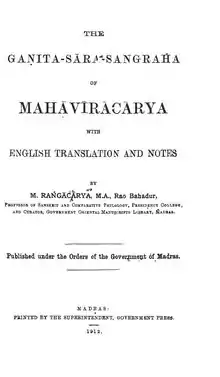| Gaṇita-sāra-saṅgraha | |
|---|---|
 | |
| Information | |
| Religion | Jainism |
| Author | Māhāvīrācharya |
| Language | Sanskrit |
| Period | 9th century |
Gaṇitasārasan̄graha (Compendium on the gist of Mathematics) is a mathematics text written by Māhāvīrācharya. It is first text completely written on mathematics with questions asked in it being completely different from one asked in previous texts composed in Indian subcontinent. In the 9th century, during Amoghavarsha's rule[1] Mahaviracharya wrote Ganitsara sangraha which is the first textbook on arithmetic in present day.[2] The book describes in details the current method of finding Lowest Common Multiple (LCM).[3]
Structure
- Sangyaādhikāra (Terminology)
- Parikarmavyāvhār (Arithmetical operations)
- Kālaswarnavyavhār (Fractions)
- Prakīrñakvyavhār (Miscellaneous problems)
- Trairāshik (Rule of three)
- Miśravyavhār (Mixed problems)
- Kśetragaṇit vyavhār (Measurement of Areas)
- Khātvyavhār (calculations regarding excavations)
- Chāyāvyavhār (Calculations relating to shadows)
Quotes
The work praises mathematics as follows:
लौकिके वैदिके वापि तथा सामयिकेऽपि यः।
व्यापारस्तत्र सर्वत्र संख्यानमुपयुज्यते॥
Meaning: All the extant things in three worlds can’t exist without their foundation being in mathematics.
The end of the first chapter Sangyaādhikāra describes the following eight qualities of a mathematician:
लघुकरणोहापोहानालस्यग्रहणधारणोपायैः।
व्यक्तिकरांकविशिष्टैर् गणकोऽष्टाभिर् गुणैर् ज्ञेयः॥
Meaning: A mathematician is to be known by eight qualities: conciseness, inference, confutation, vigour in work and progress, comprehension, concentration of mind and by the ability of finding solutions and uncovering quantities by investigation.
References
Bibliography
- Jain, L.C., ed. (1963). Gaṇita-sāra-saṁgraha. Sholapur: Gulabchand Hirachand Doshi Jain Jaina Saṁskṛti Saṁrakshaka Saṁgha.
An English-Kannada translation of the book by Dr Padmavathamma was published by the Sri Hombuja Jain Math in 2000